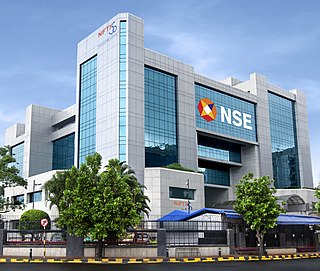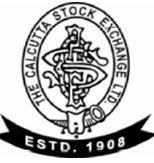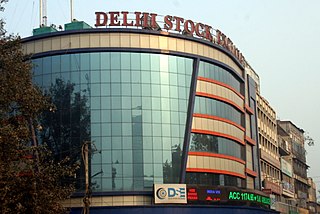Related Research Articles

The Securities and Exchange Board of India (SEBI) is the regulatory body for securities and commodity market in India under the administrative domain of Ministry of Finance within the Government of India. It was established on 12 April 1988 as an executive body and was given statutory powers on 30 January 1992 through the SEBI Act, 1992.

BSE Limited, also known as the Bombay Stock Exchange (BSE), is an Indian stock exchange which is located on Dalal Street. Established in 1875 by cotton merchant Premchand Roychand, it is the oldest stock exchange in Asia, and also the tenth oldest in the world. The BSE is the world's 6th largest stock exchange with a market capitalization exceeding US$5 trillion on May 21, 2024.

National Stock Exchange of India Limited (NSE) is one of the leading stock exchanges in India, based in Mumbai. NSE is under the ownership of various financial institutions such as banks and insurance companies. It is the world's largest derivatives exchange by number of contracts traded and the third largest in cash equities by number of trades for the calendar year 2022. It is the 7th largest stock exchange in the world by total market capitalization, exceeding $5 trillion on May 23, 2024. NSE's flagship index, the NIFTY 50, is a 50 stock index that is used extensively by investors in India and around the world as a barometer of the Indian capital market. The NIFTY 50 index was launched in 1996 by NSE.
The Madras Stock Exchange (MSE) was a stock exchange in Chennai, India. The now defunct MSE was the fourth stock exchange to be established in the country and the first in South India. It had a turnover (2001) of ₹ 3,090 crore, but was a fraction of the turnover generated by the Bombay Stock Exchange and National Stock Exchange of India. The turnover of the stock exchange was 19,907 Crore as of the financial year 2012.
Ludhiana Stock Exchange (LSE) is a defunct stock exchange that was fully owned by Government of India. It was established in the year 1983. By 1999-2000, the exchange had a total of 285brokers, out of which 79 were corporate brokers. Among 284 brokers, it was further classified as 212 proprietor broker, 2 partnership broker and 70 corporate broker. Then, there was only 2 sub-brokers registered.

Inter-connected Stock Exchange Ltd. (ISE) is an Indian national-level stock exchange. under the ownership of Ministry of Finance, Government of India. It is responsible for providing trading, clearing, settlement, risk management and surveillance support to its trading members. It started its operation in 1998 in Vashi, Mumbai, and has 841 trading members, who are located in 18 cities. These intermediaries are administratively supported through the regional offices at Delhi, Kolkata, Patna, Ahmedabad, Coimbatore and Nagpur, besides Mumbai.
Bangalore Stock Exchange (BgSE), was a public stock exchange based in Bangalore, India fully owned by Government of India. It was founded in 1963 and had 595 regional and non-regional companies listed. In September 2005, the BgSE announced plans to go public by divesting at least 51% of its ownership. The stock exchange was managed by a Council of Management, consisting of members appointed by the Securities and Exchange Board of India. It was the first stock exchange in South India to start electronic trading of securities in 1996.

Calcutta Stock Exchange (CSE) is an Indian stock exchange based in Kolkata, India. It is owned by Ministry of Finance, Government of India. It is one of oldest stock exchanges in Asia and third largest bourse in India. It was founded in May 1908 at 2, China Bazar Street.
Cochin Stock Exchange was an Indian stock exchange in Kochi, Kerala fully owned by Government of India. It was incorporated in 1978. At its peak, it had almost 500 Indian companies listed, and with a daily turnover of ₹70–₹100 crore, it was the fourth largest exchange in India.
Madhya Pradesh Stock Exchange (MPSE) was a stock exchange located at Indore, Madhya Pradesh, India. It was a SEBI recognized Permanent Stock Exchange, until its de-recognition in 2015. Established in 1919, it was 3rd oldest stock exchange in India, and a leading stock exchange under outcry system.

The Ahmedabad Stock Exchange (ASE) is the second oldest exchange of India located in the city of Ahmedabad in the Western part of the country and is fully owned by Government of India. It is recognised by Securities Contract (Regulations) Act, 1956 as permanent stock exchange. Its logo consists of the Swastika, which is one of the most auspicious symbols of Hinduism depicting wealth and prosperity.
Bhubaneswar Stock Exchange (BhSE) was a stock exchange located in Bhubaneswar, Odisha, India. It was incorporated on 17 April 1989, and granted recognition to the Stock Exchange on 5 June 1989, by the Ministry of Finance, Govt. of India. It is one among the 21-odd regional stock exchanges in India.

Delhi Stock Exchange (DSE) was a stock exchange located in New Delhi.
Guwahati Stock Exchange (GSE) was a stock exchange located in Gauhati, Assam.
Magadh Stock Exchange Association Ltd (MSEA) is located in Patna, India. It was established in the year 1986. It is one among the 25 odd regional stock exchanges in India. The exchange was disbanded on 3 September 2007 by Securities and Exchange Board of India (SEBI).
Pune Stock Exchange (PSE) was established in 1982. The Securities and Exchange Board of India (SEBI) allowed the exchange to exit bourse business with an order on 13 April 2015. Earlier, the SEBI had allowed various stock exchanges including OTC Exchange of India, Cochin Stock Exchange, Ludhiana Stock Exchange, Gauhati Stock Exchange, Bhubaneswar Stock Exchange, Hyderabad Stock Exchange, Coimbatore Stock Exchange, Inter-connected Stock Exchange of India and Bangalore Stock Exchange to exit from the bourse business.
The OTC Exchange Of India (OTCEI), also known as the Over-the-Counter Exchange of India, was based in Mumbai, Maharashtra. It is under the ownership of Ministry of Finance, Government of India. It is India's first exchange for small companies, as well as the first screen-based nationwide stock exchange in India. OTCEI was set up to access high-technology enterprising promoters in raising finance for new product development in a cost-effective manner and to provide a transparent and efficient trading system to investors.
Religare Enterprises Limited (REL) is an Indian investment and financial services holding company, headquartered in New Delhi. REL is listed on National Stock Exchange of India and Bombay Stock Exchange. It is registered with the Reserve Bank of India (RBI).
Angel One Limited, formerly known as Angel Broking Limited, is an Indian stockbroker firm established in 1996. The company is a member of the Bombay Stock Exchange, National Stock Exchange of India, National Commodity & Derivatives Exchange Limited and Multi Commodity Exchange of India Limited. It is a depository participant with Central Depository Services Limited (CDSL).
The NSE co-location scam relates to the market manipulation at the National Stock Exchange of India, India's leading stock exchange. Allegedly select players obtained market price information ahead of the rest of the market, enabling them to front run the rest of the market, possibly breaching the NSE's purpose of demutualisation exchange governance and its robust transparency-based mechanism. The alleged connivance of insiders by rigging NSE's algo-trading and use of co-located servers ensured substantial profits to a set of brokers. This widespread market fraud came to light when markets' regulator, the Securities and Exchange Board of India (SEBI), received the first anonymous complaint through a whistle-blower's letter in January 2015. The whistle-blower alleged that trading members were able to capitalise on advance knowledge by colluding with some exchange officials. The overall default amount through NSE's high-frequency trading (HFT) is estimated to be ₹500 billion over five years.
References
- 1 2 "SEBI allows exit of Coimbatore Stock Exchange as bourse". The Hindu. 4 April 2013. Retrieved 3 February 2014.
- ↑ "Coimbatore SE members allowed to furnish personal guarantee". Coimbatore. The Indian Express. 20 June 1997. Archived from the original on 21 February 2014. Retrieved 3 February 2014.
- ↑ Vijaykumar, Arun (30 March 2018). "Sebi seeks more time to mull battleground Coimbatore stock exchange's future". Pune. Economic Times. Archived from the original on 21 February 2014. Retrieved 3 February 2014.
- ↑ R Y, Narayanan (5 January 2005). "Hopes on revival of Coimbatore bourse". Coimbatore. The Hindu . Retrieved 3 February 2014.